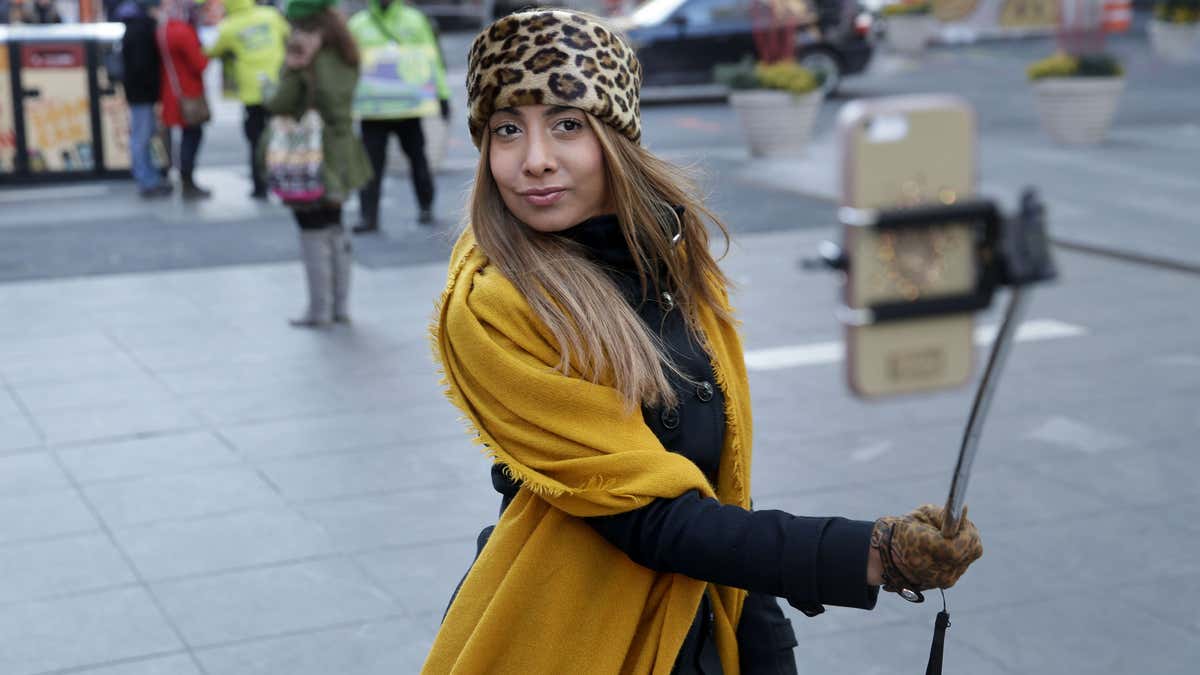
Jan. 8, 2015: Sandy Johal uses a selfie stick to take a picture of herself in New York's Times Square. (AP)
LOUISVILLE, Ky. – For the 160,000 people crammed into Churchill Downs on Derby Day, picture-taking can run neck-and-neck with betting and sipping mint juleps amid a winning field of photo opportunities: sleek racehorses, daring fashion statements, celebrities and the twin spires.
But this year, they'd better not use selfie sticks.
Joining a growing list of museums, music festivals and sports venues around the world, the iconic Louisville track hosting the 141st running of the Kentucky Derby on May 2 has banned the pole-like contraptions that grasp cellphones and allow people a longer reach to snap their self-portraits.
Other events such as the Coachella and Lollapalooza music festivals also have banned the photo aids. Prominent museums including the Smithsonian and the National Gallery of Art in Washington prohibit their use. Selfie sticks aren't allowed inside Yankee Stadium. Some English Premier League soccer teams make the devices off-limits, and the Australian Open tennis tournament discourages fans from using them court-side
Churchill Downs encourages selfies and the avalanche of social media attention they can generate. But banishing selfie sticks is a safety measure to protect the horses and the massive crowd on Derby Day, track spokesman John Asher said.
"I don't think it's a huge sacrifice for anybody who loves to take a selfie," Asher said. "You'll still be able to take a selfie. You just won't be able to take one of yourself as if your arms were nine feet long."
The selfie stick ban will extend beyond Derby Day to apply whenever there is live racing at Churchill, he said.
Chris Scherf, executive vice president of the Thoroughbred Racing Associations, said he hasn't heard of any other U.S. horse tracks banning the devices. But he said he wouldn't be surprised if other big tracks follow Churchill's lead.
"Actually I would expect a lot of sports to have concerns about their potential misuse," he said in an email.
At Belmont Park in New York, a review of security policies for the June 6 Belmont Stakes will include selfie sticks, said track spokeswoman Jenny Kellner.
Meanwhile, the NFL is evaluating whether to allow the devices into stadiums next season, said league spokesman Brian McCarthy.
Canadian inventor Wayne Fromm, who took out a selfie stick patent a decade ago, said he had no problem with Churchill's policy.
"It's prudent to limit its use because, even inadvertently, it could cause a problem," he said. "We have to roll with the punches."
Fromm said he doubts such policies will hurt sales for his Quik Pod devices.
"It's like saying if you can't use your camera at a concert, does that mean people aren't going to buy cameras anymore?" he said.
Another selfie-stick entrepreneur, Jacqueline Verdier, CEO of Selfie on a Stick, said banning the device from events like the Derby is a disservice to fans.
"There would have been some amazing photo opportunities that unfortunately are not going to be there," she said.
Verdier downplayed safety concerns with the devices: "Like so many other things in life, people just have to be respectful of others around them."
Natasha Jensen, a University of Louisville student planning to attend this year's Derby with friends, said she sees the track's ban as a good safety precaution, especially in the seemingly anything-goes infield.
"It goes get loud and rowdy," she said.
Jensen, a 21-year-old criminal justice major, said she expects to spend more time taking selfies than betting at the Derby: "I have such bad luck, I don't bet on horses very much." She doesn't think the selfie stick ban will generate much reaction.
"I don't think it will be that big of a deal this year because they're still an up-and-coming product," she said.
Asher predicted that Derby Day will still produce plenty of creative selfies, even without selfie sticks.
Churchill Downs officials worried that a selfie stick along the rail could become a distraction for horses, Asher said. And it's a day when the alcohol flows during the long racing card.
"Somebody might think it's a light saber after a little while," Asher said, tongue-in-cheek. "You never know."
